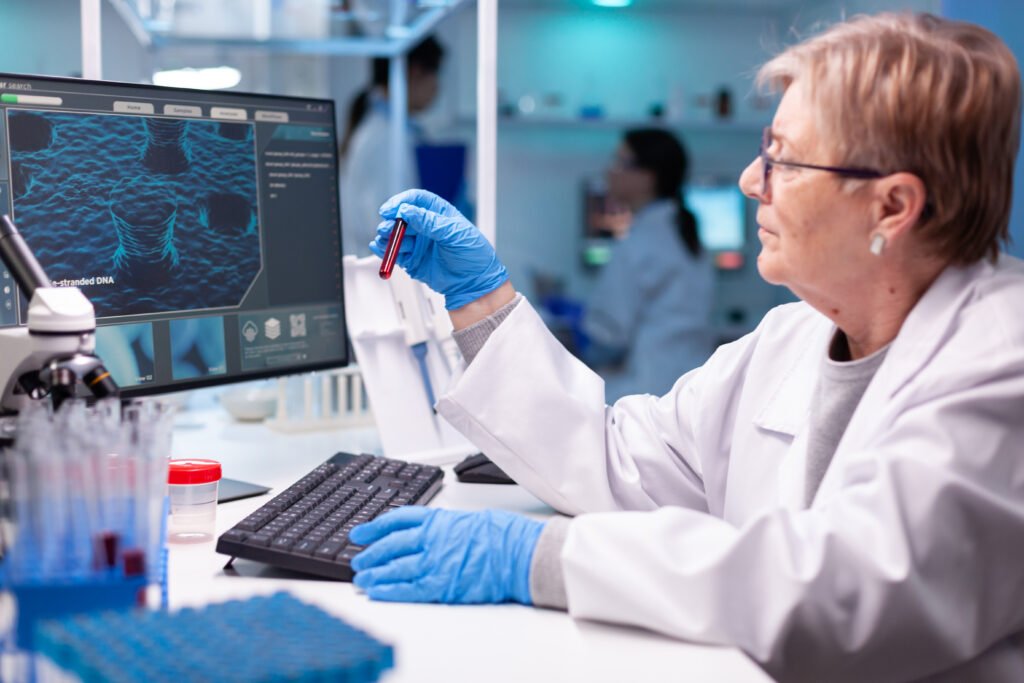Introduction
Cancer affects millions of people throughout the globe, therefore medical research is always looking for new ways to stop it and cure it. In this area, technology is more important than ever before. Cancer research technology is making discoveries that were thought to be decades away happen faster. These include cutting-edge gene-editing techniques and powerful AI systems. This blog talks about some of the most cutting-edge technologies that are changing oncology and helping us find, treat, and learn about cancer in ways we never thought possible. If you’re a healthcare worker, a researcher, or just interested, here is all you need to know about how technology may help with cancer research.
How AI is Accelerating Breakthroughs in Cancer Research
AI in Early Detection and Diagnosis
AI systems can now scan medical pictures like mammograms and CT scans with amazing accuracy. Google’s DeepMind AI detects breast cancer in mammograms with fewer errors than human radiologists.
Predicting Outcomes and Personalizing Treatment Plans
AI also helps oncologists figure out how a disease may progress by looking at a patient’s medical history and genetic information. IBM’s Watson for Oncology suggests personalized therapies using research-driven insights for better outcomes.
Top Emerging Technologies Powering Cancer Detection
Finding cancer early on usually makes it more likely that you will live. This is simpler and better than ever thanks to new technology.
- Liquid Biopsies: This easy blood test may reveal tiny bits of cancer DNA, termed circulating tumor DNA (ctDNA), in their early stages. It doesn’t hurt and can discover cancers like lung and colon without the need for regular tissue samples.
- Immuno-PCR: This method combines the genetic coding of PCR with the sensitivity of immunoassays to detect cancer biomarkers with a high level of accuracy.
- Artificial Neural Networks (ANNs): ANNs let you use more than one diagnostic method at once, such blood testing and imaging tests, to look for early signs of cancer.
Nanotechnology’s Impact on Targeted Cancer Therapies
Precision Drug Delivery
Scientists may target malignant tumors with chemotherapy medications by attaching them to nanoparticles. This keeps good cells from being harmed and greatly lowers adverse effects.
Hyperthermia Treatments
Nanoparticles that are heated by outside forces, such magnetic fields, may kill tumor cells directly or make them more responsive to therapies like radiation therapy.
Revolutionary Imaging Tools Enhancing Tumor Analysis
Molecular Imaging
This lets you see how molecules move around in the body, which gives you a real-time look into how tumors develop and spread.
3D Imaging Technology
3D MRI and 3D ultrasound are two tools that produce very detailed pictures of tumors. These pictures help surgeons plan therapies and learn more about how tumors act.
CRISPR and Gene Editing: Reshaping Cancer Research Frontiers
Potential Applications in Oncology
- Getting rid of genetic mutations in cancer cells via CRISPR.
- Making creatures that are resistant to cancer for scientific objectives.
Wearable Devices in Monitoring Cancer Progression
Remote Patient Monitoring
These gadgets can keep an eye on important signals like heart rate variability or oxygen saturation and let clinicians know about any worrying changes from a distance.
Enhanced Survivorship Programs
Helping patients who have finished treatment keep an eye on their health and look for signals of recurrence may greatly speed up their recovery.
Big Data and Cloud Computing in Oncology Research
Integrative Data Platforms
The Cancer Genome Atlas (TCGA) and other platforms make datasets available to everyone, so researchers from all around the globe may work together and learn more about problems in cancer research.
Accelerating Clinical Trials
Cloud computing makes it easier to find individuals who are qualified for clinical trials, which means that researchers can get more people to test novel treatments quicker.
Future Trends in Cancer Research Technology You Should Know
Research on cancer is moving along quite quickly. In the foreseeable future, here are some trends to keep an eye on:
- Quantum Computing will change the way we simulate how molecules interact with one other.
- Scientists will be able to create whole new biological systems as medicines thanks to synthetic biology.
- Digital Twin Technology will create virtual models of how each patient will respond to cancer treatments before they really start.
Conclusion
It seems like these new tools for cancer research will be very useful in the future for treating cancer. Quantum computing, synthetic biology, and digital twin technologies are just a few of the new tools that are changing how we find, treat, and stop cancer. Doctors and researchers may be able to provide their patients more individualized and effective treatment with these new technologies. This will assist people all throughout the globe attain better results. The more sophisticated technology becomes, the more probable it is that we will find big new things. This brings us one step closer to being able to treat cancer and maybe even stop it from happening in the first place. There is little question that the future of cancer research is full with new ideas and promise.







Leave a Reply